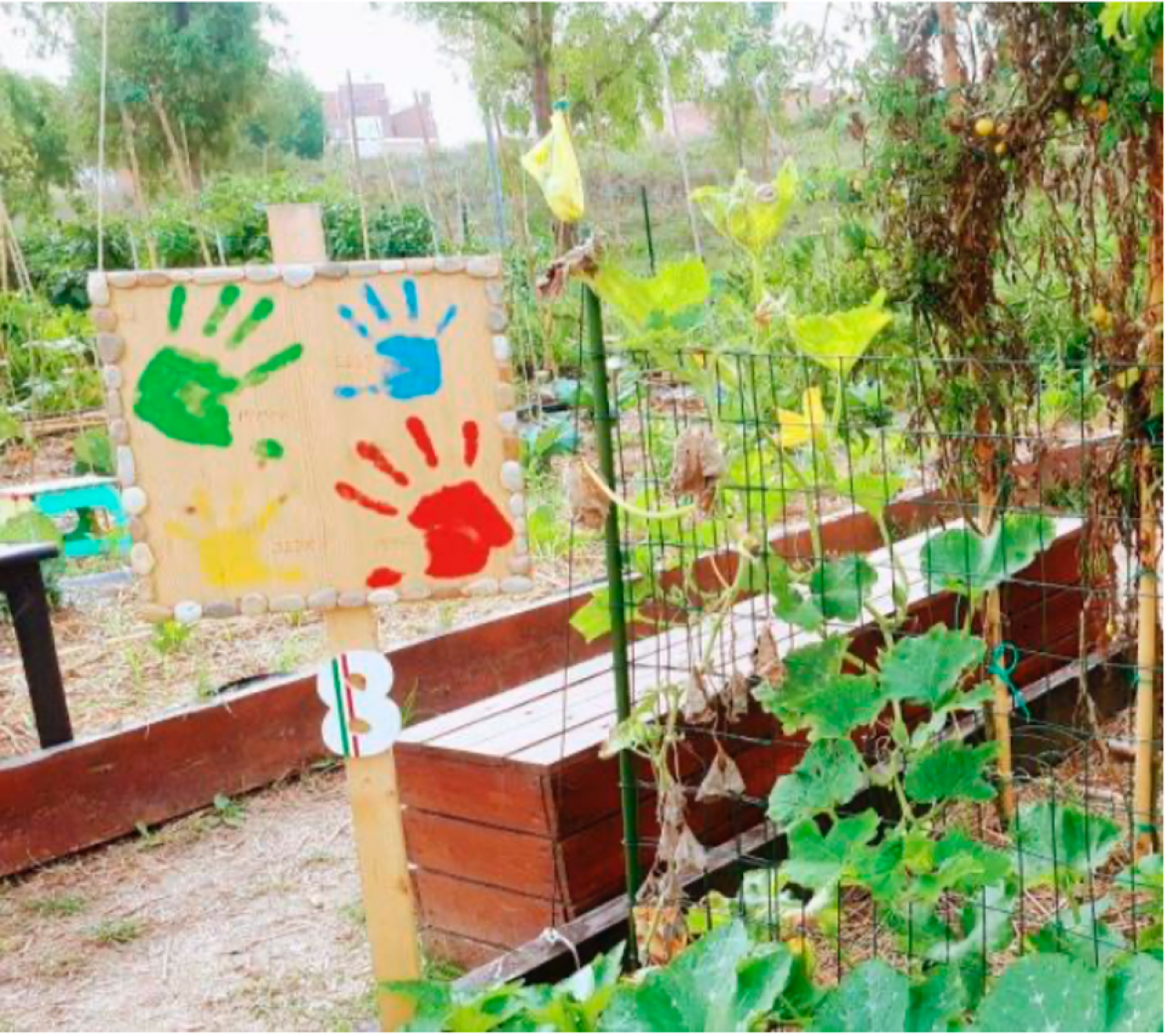
Discover how URBACT cities are using sustainable food and urban agriculture to address an array of local challenges.
In this article, URBACT Programme Expert Marcelline Bonneau shines a light on several URBACT partner cities making the transition towards more sustainable local food ecosystems – and some of the practices they have developed in the process. She concludes with a reminder of the importance of integrated food policies at city level.
A multitude of local food solutions in URBACT cities
Since 2013, the URBACT programme has supported seven networks working on topics linked to sustainable food and urban agriculture engaging around 50 European cities in transnational learning and exchange. These are: Food Corridors, BioCanteens, RU:rban, BeePathNet, Sustainable Food in Urban Communities, Agri-Urban and Diet for a Green Planet.
The diverse topics covered by these URBACT cities reflect the complexity of our food systems and the interlinkages between sectors and policy priorities, as presented in the overview below.
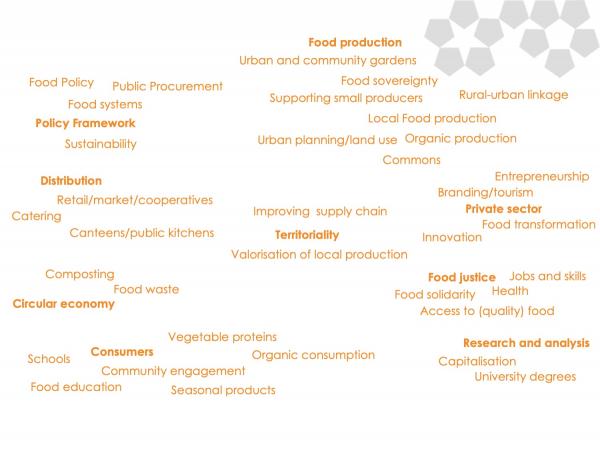
Themes covered by URBACT networks © Marcelline Bonneau
From food to health, supporting social justice and fairness
The Covid-19 pandemic has made increasingly obvious the need to ensure that nobody is left behind when considering one of our core primary needs, food. Amongst others, Atheniou (CY) Mollet del Vallès (ES), Milan (IT) and Mouans-Sartoux (FR) have been particularly active in readjusting their food systems during the pandemic, embedding solidarity in the further integration of their local food systems.
In Mollet del Vallès, food justice has been on the agenda for quite a few years, as shown in the city’s involvement in the URBACT networks Diet for a Green Planet and Agri-Urban. The “Eat Well in Mollet” strategy promotes healthy dietary habits by giving citizens access to nutritious, local, organic and sustainable food, while educating them to make healthy food choices. Support under the strategy for vulnerable populations includes social allotments in an agro-ecological park.
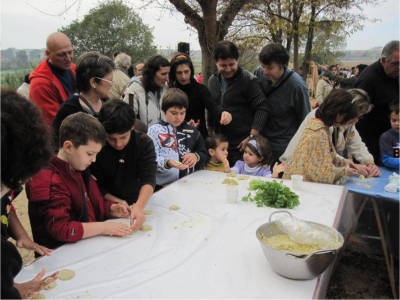
Workshop with families © City of Mollet dèl Vallès
Food sovereignty as a cement for local production ecosystem
Food sovereignty, as defined by Via Campesina, asserts that the people who produce, distribute, and consume food should control the mechanisms and policies of food production and distribution.
To achieve food sovereignty and ensure local access to food, many cities have realised the importance of more locally based production, while supporting organic cultivation (including in urban gardens), as well as more sustainable distribution chains (supermarkets, markets, cooperatives…) and processing and preparation of food (catering, canteens).
The LAG Pays de Condruses (BE), part of the URBACT Agri-Urban and BioCanteens networks, has implemented an agricultural incubator model, combining food production, training and sale – the first such project in Wallonia (Belgium). Called ‘Point Vert’ (Green Point), the project offers access to organic land and streamlining of infrastructure and tools over six ha (including six greenhouses of 700 m2). Trainees can experiment with different crops and cultivation techniques and receive technical, entrepreneurial and selling support. It also provides a meeting and networking space for farmers.
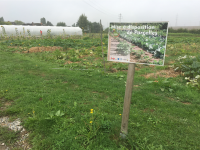
Point Vert © Strategic Design Scenarios (SDS)
In addition, ensuring adequate urban planning and land use have also become key concerns. While still in its infancy, the URBACT Food Corridors network is seeking to reinforce rural-urban linkages, at the level of cities and (micro) regions.
Food tourism as a key driver for cities
Other cities focus on the attractiveness of their territory by increasing and improving local production, the processing and preparation of food, and the branding and promotion of their local products. This is the focus of Amarante (ES), part of the BeePathNet network, which focuses on urban beekeeping in relation to local environment, biodiversity and food self-sufficiency challenges. The city is developing a ‘Bee Path’ platform to promote its bee and honey-related products and attract tourists. The city works with beekeepers as well as schools, and, obviously, everybody takes part in World Bee Day!
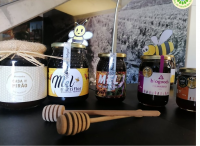
Bee products in Amarente © City of Amarante
What about us people?
Many cities have a focus on the need to change consumer behaviour: inviting their citizens to consume more organic, seasonal, local and plant-based diets, while strengthening local community engagement.
In Krakow (PL), member of the URBACT RU:RBAN network, this is done via the ‘Gardens with Class’ programme for Community-building and schools. This programme supports the set-up of gardens in primary schools, a method that is educational both in terms of form and content, with a direct experience of nature. The ultimate goal is to open these gardens to the community and to reward school teachers with prizes for their engagement and achievements. Around 50 teachers are involved in 18 schools (one per district), with benefits expected for local communities, health, teachers’ careers, and new ways of learning.
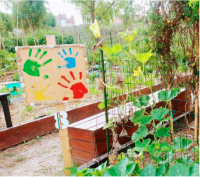
‘Gardens with Class’ in Krakow © City of Krakow
Public procurement as a leverage for supporting local organic consumption
Cities can also work to turn legislative and market frameworks from obstacles to enablers in encouraging a shift towards more sustainability. Public procurement is one such tool which has proven to be extremely useful for European cities.
For example, Mouans-Sartoux (FR) – lead partner of the URBACT BioCanteens network – has opened the debate for elected representatives and civil servants to adapt legislation so that public procurement can effectively improve food provisioning for school canteens. The key principles applied by Mouans-Sartoux are:
Separating out previously large food ‘lots’ to enable local mono producers to submit proposals;
Systematic and organised inclusion of organic produce;
An increase of organic food lots;
Introducing questionnaires to increase understanding of local suppliers and their produce; and,
Defining selection criteria to better take into account quality and environmental issues.
As such, collaboration with local suppliers has become more realistic and efficient than ever.
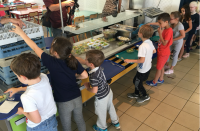
A sustainable school canteen in Mouans-Sartoux © Strategic Design Scenarios (SDS)
The importance of local urban food policies
These are just some of the many stories we could share from URBACT cities across Europe. Overarching all these specific and individual examples is the importance of cities developing an adequate policy framework to ensure a coherent and structured, but also transversal and integrated way of supporting food and urban agriculture-related projects. This is especially challenging as food policy is still addressed by multiple ministries and departments across local, regional and national levels. We don’t have Food Ministries in Europe yet!
A great example of such a policy approach and one of the flagship outcomes of the URBACT Sustainable Food in Urban Communities network is the Brussels Good Food Strategy. Working within the network, the region developed a local participatory process, gathered knowledge, co-created a vision, and planned measurable actions.
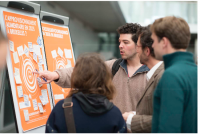
The co-creation of the Good Food strategy in Brussels © Bruxelles environnement
The resulting strategy was launched in 2016 along the principles of inclusion, local authorities leading by example, partnerships, behavioural change and increasing stakeholder ability to initiate their own projects. The strategy includes 15 actions structured under seven thematic headings:
Increase local sustainable food production;
Support the transition to a re-localised and sustainable supply for all;
Support the transition of demand [towards more sustainable food products] for all;
Develop a sustainable and desirable "good food" culture;
Reduce food waste;
Design and promote the food systems of the future; and
Ensure strategic implementation.
After the success of this strategy, a new, more ambitious strategy is on its way for 2022, co-created once again by all the stakeholders of the Brussels’ food ecosystem.
We look forward to the outcomes of the ongoing URBACT networks related to food and to seeing their partner cities’ journeys towards better access to local high quality products for their citizens.
Interested in more sustainable urban food policies and approaches? We invite you to dig into the information already shared by our cities and networks and check out future URBACT articles on the theme of food.
